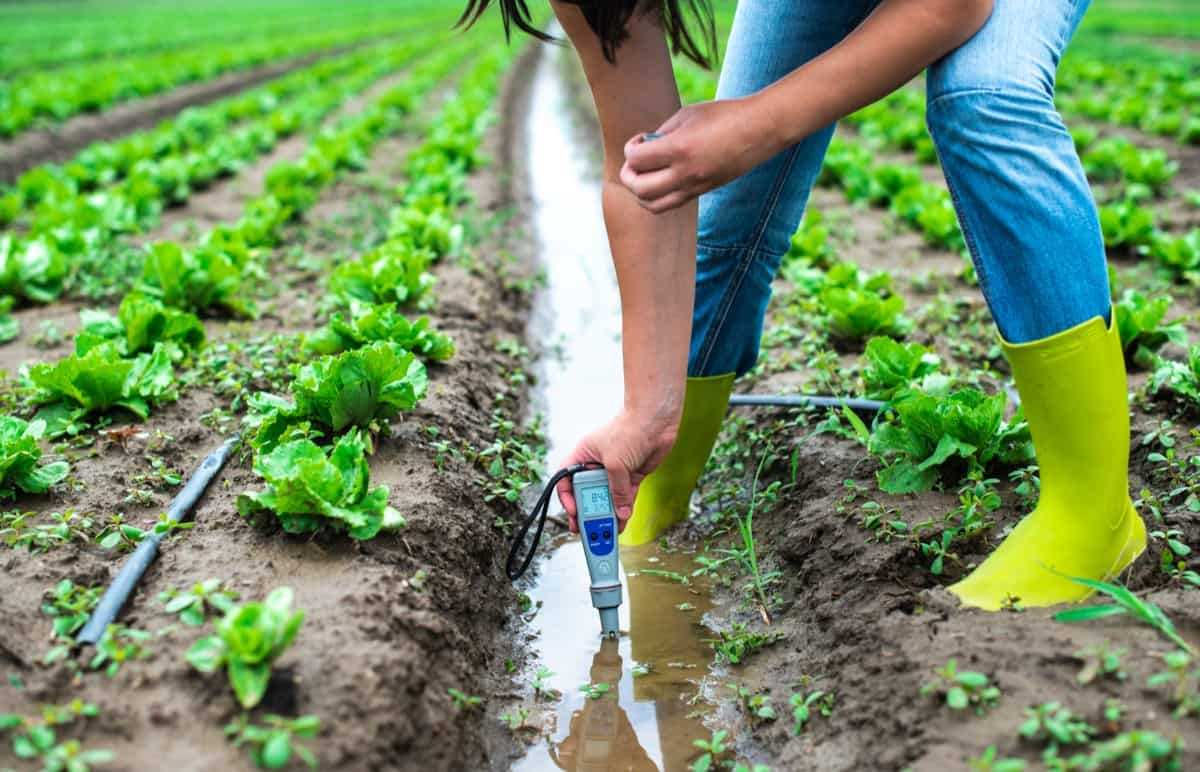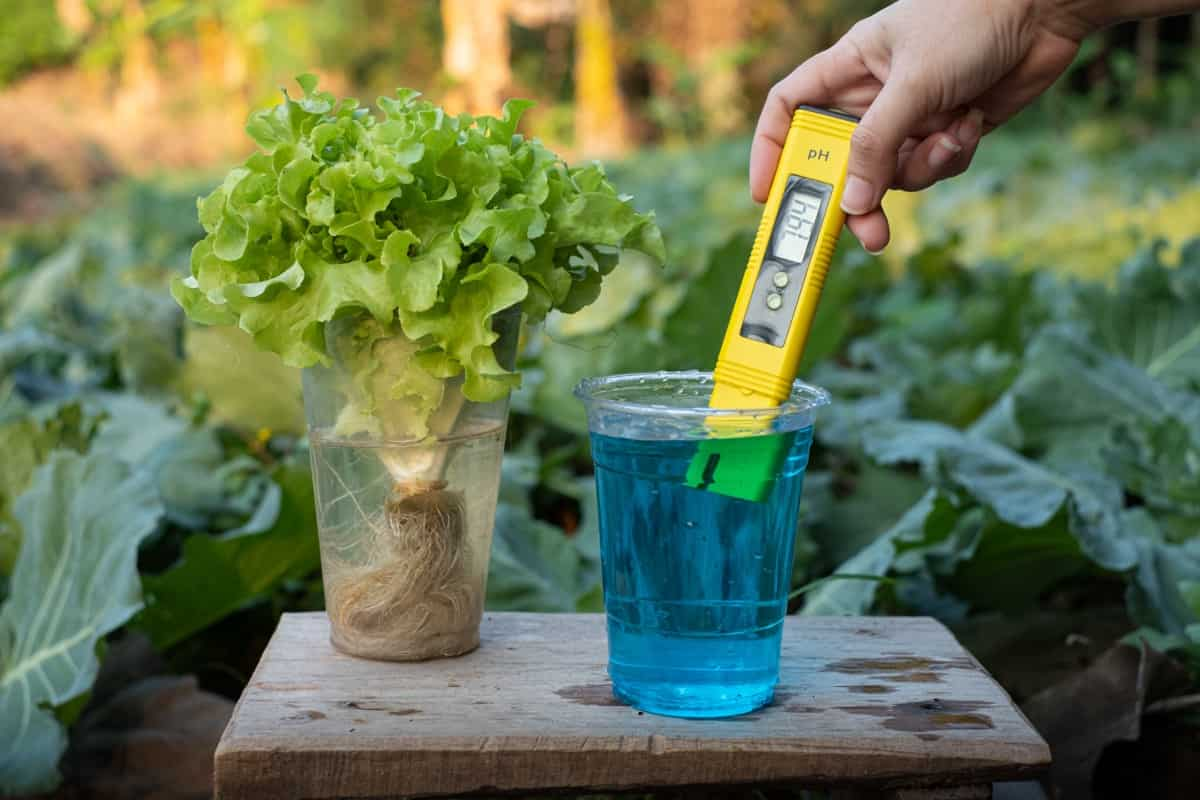The pH of water can have a big impact on your plants. If the water pH is too high, it can cause problems for your plants. The water pH is a measure of how acidic or basic it is. pH level is measured on a scale from 0 to 14. A pH level of 7 is neutral. A pH level less than 7 is acidic, and a pH greater than 7 is basic. The ideal water pH level for most plants is between 6 and 7.

The pH scale
- The pH level measures how acidic or basic a substance is. It runs from 0 to 14, with 7 being neutral. Any pH scale below 7 is considered acidic, and anything above 7 is considered basic.
- Water can have different pH levels depending on where it comes from. For example, rainwater has a pH of around 5.5, while tap water typically has a pH of around 8.0.
- Soil also has a pH level ranging from 3.5 to 8.0. The ideal pH level for most plants is between 6.0 and 7.0.
- When the water pH level is too high or too low, it can cause problems for plants. For example, acidity can make it harder for plants to take up nutrients from the soil, while alkalinity can make it difficult for plants to absorb water.
- If you think your plants may suffer from a pH imbalance, you can test the soil and water using a simple pH test kit. Once you know the pH levels, you can adjust them to help your plants thrive.
The effects of water on plants
Water is essential for all plants’ survival, but water’s pH can greatly impact plant growth. Plants need water for several reasons, including transporting nutrients and minerals from the soil to the leaves, helping cool the leaves in hot weather, and providing moisture for photosynthesis. The ideal pH level for most plants is between 6 and 7. Water with a pH lower than 6 can be acidic and cause damage to the roots, while water with a pH above 7 can be alkaline and prevent the absorption of nutrients.
Plants grown in pots or containers are more susceptible to pH-related problems because they have less soil to buffer against changes in water pH. That’s why it’s important to test the pH of your water before watering your plants. There are several ways to change water pH, including using commercial products or adding household items like vinegar or lemon juice. If you have hard water, you can also install a water softener.
How to test the pH of your water
If you’re not sure what the pH of your water is, it’s important to test it before using it to water your plants. Here’s how:
- Fill a clean glass container with about 1 cup of water.
- Add 1 drop of pH indicator solution to the water and stir gently.
- Compare the solution color to the pH chart included with your pH indicator solution to find the pH of your water.
In case you missed it: Water pH Balancer for Agriculture

What is water pH importance in plants
All plants require water to grow, but not all water is the same. The pH of water can have a big impact on how well your plants grow. pH stands for “potential of hydrogen.” While some plants tolerate a wide range of pH levels, others are very sensitive to small changes. For example, hydrangeas will change color based on the pH of the soil they are grown in. Blue hydrangeas need an acidic environment to stay blue, while pink hydrangeas need a more alkaline environment.
If you’re not sure what the pH of your water is, you can test it with litmus paper or a digital pH meter. Once you know the pH level of your water, you can adjust it if needed using chemicals like sulfuric acid or sodium hydroxide. It’s important to remember the pH of your water because even small changes have a big impact on your plants. If you notice that your plants are not growing as well as they should be, testing the pH of your water is a good place to start troubleshooting.
How are plants affected by water pH?
- Plants are affected by the pH of water because they absorb nutrients through their roots. Therefore, when the water around a plant’s roots is too acidic or alkaline, it can interfere with its ability to uptake nutrients. This can lead to nutrient deficiencies and other problems.
- To ensure that your plants get the proper amount of nutrients, it is important to test the water pH and adjust it if necessary. You can test the water’s pH level at home with a simple test kit. Most garden centers and nurseries also offer pH testing services.
- The water pH can affect plant growth in several ways. For instance, if the pH of water is too high, it can cause problems with the uptake of nutrients by plants. This can lead to stunted growth or even death. Additionally, high-pH water can also increase the toxicity of toxic chemicals in the soil, which can harm plants.
- If the water pH level is too low, it is difficult for plants to absorb certain nutrients. This can also lead to stunted growth or death. Also, low-pH water can make soils more acidic, harming plants.
What happens if the pH of water is too high for plants?
If the water pH level is too high for plants, it can cause them to wilt, become stunted, and eventually die. High-pH water can also cause problems with the uptake of nutrients by plants, which can lead to deficiency symptoms.
In case you missed it: The Benefits of Yucca Shidigera in Aquaculture

What pH water is good for plants?
The ideal pH level for most plants is between 6 and 7. Plants that grow in water with a pH lower than 6 may experience stunted growth, while those that grow in water with a pH higher than 7 may experience leaf burn.
What will happen to a plant if the water pH is wrong?
If the pH of the water is wrong, it can cause problems for your plants. For example, if the water is too acidic, it can make it difficult for plants to absorb soil nutrients. This can lead to yellow leaves, stunted plant growth, and other problems. Conversely, if the water is too alkaline, it can cause nutrient deficiencies and other issues.
Conclusion
The pH is an important factor to consider when watering your plants. Depending on the type of plant, they may prefer more acidic or alkaline water. For example, roses prefer slightly acidic water, while impatiens prefer slightly alkaline water. Knowing the pH preference of your plants will help you ensure they are getting the right type of water to thrive.
